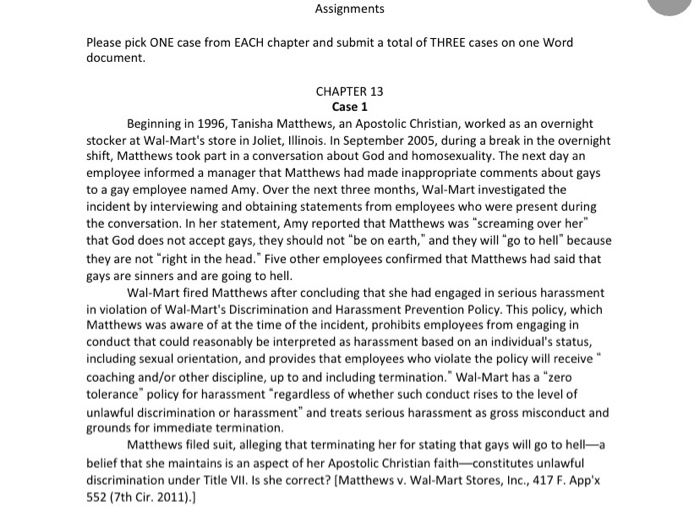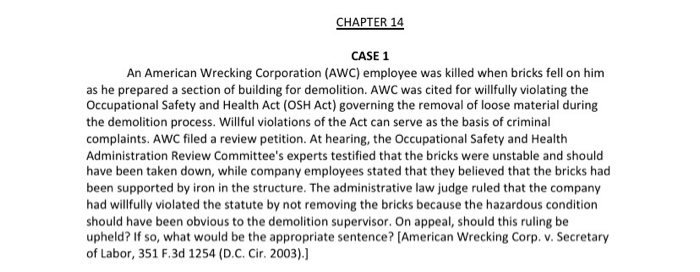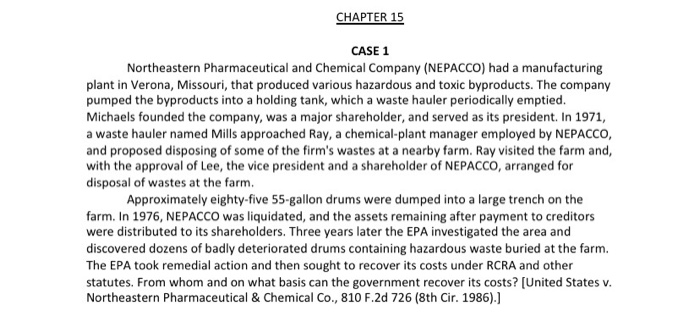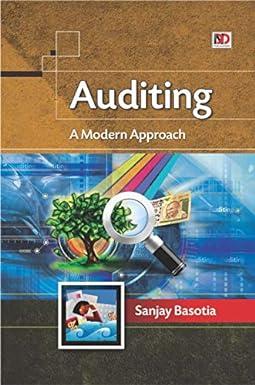Answered step by step
Verified Expert Solution
Question
1 Approved Answer
Business Law These are the cases I selected. Assignments Please pick ONE case from EACH chapter and submit a total of THREE cases on one
Business Law
Assignments Please pick ONE case from EACH chapter and submit a total of THREE cases on one Word document. CHAPTER 13 Case 1 Beginning in 1996, Tanisha Matthews, an Apostolic Christian, worked as an overnight stocker at Wal-Mart's store in Joliet, Illinois. In September 2005, during a break in the overnight shift, Matthews took part in a conversation about God and homosexuality. The next day an employee informed a manager that Matthews had made inappropriate comments about gays to a gay employee named Amy. Over the next three months, Wal-Mart investigated the incident by interviewing and obtaining statements from employees who were present during the conversation. In her statement, Amy reported that Matthews was "screaming over her" that God does not accept gays, they should not "be on earth," and they will go to hell" because they are not "right in the head." Five other employees confirmed that Matthews had said that gays are sinners and are going to hell. Wal-Mart fired Matthews after concluding that she had engaged in serious harassment in violation of Wal-Mart's Discrimination and Harassment Prevention Policy. This policy, which Matthews was aware of at the time of the incident, prohibits employees from engaging in conduct that could reasonably be interpreted as harassment based on an individual's status, including sexual orientation, and provides that employees who violate the policy will receive coaching and/or other discipline, up to and including termination." Wal-Mart has a "zero tolerance policy for harassment regardless of whether such conduct rises to the level of unlawful discrimination or harassment" and treats serious harassment as gross misconduct and grounds for immediate termination. Matthews filed suit, alleging that terminating her for stating that gays will go to hell-a belief that she maintains is an aspect of her Apostolic Christian faith-constitutes unlawful discrimination under Title VII. Is she correct? (Matthews v. Wal-Mart Stores, Inc., 417 F. App'x 552 (7th Cir. 2011).) CHAPTER 14 CASE 1 An American Wrecking Corporation (AWC) employee was killed when bricks fell on him as he prepared a section of building for demolition. AWC was cited for willfully violating the Occupational Safety and Health Act (OSH Act) governing the removal of loose material during the demolition process. Willful violations of the Act can serve as the basis of criminal complaints. AWC filed a review petition. At hearing, the Occupational Safety and Health Administration Review Committee's experts testified that the bricks were unstable and should have been taken down, while company employees stated that they believed that the bricks had been supported by iron in the structure. The administrative law judge ruled that the company had willfully violated the statute by not removing the bricks because the hazardous condition should have been obvious to the demolition supervisor. On appeal, should this ruling be upheld? If so, what would be the appropriate sentence? (American Wrecking Corp. v. Secretary of Labor, 351 F.3d 1254 (D.C. Cir. 2003).] CHAPTER 15 CASE 1 Northeastern Pharmaceutical and Chemical Company (NEPACCO) had a manufacturing plant in Verona, Missouri, that produced various hazardous and toxic byproducts. The company pumped the byproducts into a holding tank, which a waste hauler periodically emptied. Michaels founded the company, was a major shareholder, and served as its president. In 1971, a waste hauler named Mills approached Ray, a chemical-plant manager employed by NEPACCO, and proposed disposing of some of the firm's wastes at a nearby farm. Ray visited the farm and, with the approval of Lee, the vice president and a shareholder of NEPACCO, arranged for disposal of wastes at the farm. Approximately eighty-five 55-gallon drums were dumped into a large trench on the farm. In 1976, NEPACCO was liquidated, and the assets remaining after payment to creditors were distributed to its shareholders. Three years later the EPA investigated the area and discovered dozens of badly deteriorated drums containing hazardous waste buried at the farm. The EPA took remedial action and then sought to recover its costs under RCRA and other statutes. From whom and on what basis can the government recover its costs? (United States v. Northeastern Pharmaceutical & Chemical Co., 810 F.2d 726 (8th Cir. 1986).] Assignments Please pick ONE case from EACH chapter and submit a total of THREE cases on one Word document. CHAPTER 13 Case 1 Beginning in 1996, Tanisha Matthews, an Apostolic Christian, worked as an overnight stocker at Wal-Mart's store in Joliet, Illinois. In September 2005, during a break in the overnight shift, Matthews took part in a conversation about God and homosexuality. The next day an employee informed a manager that Matthews had made inappropriate comments about gays to a gay employee named Amy. Over the next three months, Wal-Mart investigated the incident by interviewing and obtaining statements from employees who were present during the conversation. In her statement, Amy reported that Matthews was "screaming over her" that God does not accept gays, they should not "be on earth," and they will go to hell" because they are not "right in the head." Five other employees confirmed that Matthews had said that gays are sinners and are going to hell. Wal-Mart fired Matthews after concluding that she had engaged in serious harassment in violation of Wal-Mart's Discrimination and Harassment Prevention Policy. This policy, which Matthews was aware of at the time of the incident, prohibits employees from engaging in conduct that could reasonably be interpreted as harassment based on an individual's status, including sexual orientation, and provides that employees who violate the policy will receive coaching and/or other discipline, up to and including termination." Wal-Mart has a "zero tolerance policy for harassment regardless of whether such conduct rises to the level of unlawful discrimination or harassment" and treats serious harassment as gross misconduct and grounds for immediate termination. Matthews filed suit, alleging that terminating her for stating that gays will go to hell-a belief that she maintains is an aspect of her Apostolic Christian faith-constitutes unlawful discrimination under Title VII. Is she correct? (Matthews v. Wal-Mart Stores, Inc., 417 F. App'x 552 (7th Cir. 2011).) CHAPTER 14 CASE 1 An American Wrecking Corporation (AWC) employee was killed when bricks fell on him as he prepared a section of building for demolition. AWC was cited for willfully violating the Occupational Safety and Health Act (OSH Act) governing the removal of loose material during the demolition process. Willful violations of the Act can serve as the basis of criminal complaints. AWC filed a review petition. At hearing, the Occupational Safety and Health Administration Review Committee's experts testified that the bricks were unstable and should have been taken down, while company employees stated that they believed that the bricks had been supported by iron in the structure. The administrative law judge ruled that the company had willfully violated the statute by not removing the bricks because the hazardous condition should have been obvious to the demolition supervisor. On appeal, should this ruling be upheld? If so, what would be the appropriate sentence? (American Wrecking Corp. v. Secretary of Labor, 351 F.3d 1254 (D.C. Cir. 2003).] CHAPTER 15 CASE 1 Northeastern Pharmaceutical and Chemical Company (NEPACCO) had a manufacturing plant in Verona, Missouri, that produced various hazardous and toxic byproducts. The company pumped the byproducts into a holding tank, which a waste hauler periodically emptied. Michaels founded the company, was a major shareholder, and served as its president. In 1971, a waste hauler named Mills approached Ray, a chemical-plant manager employed by NEPACCO, and proposed disposing of some of the firm's wastes at a nearby farm. Ray visited the farm and, with the approval of Lee, the vice president and a shareholder of NEPACCO, arranged for disposal of wastes at the farm. Approximately eighty-five 55-gallon drums were dumped into a large trench on the farm. In 1976, NEPACCO was liquidated, and the assets remaining after payment to creditors were distributed to its shareholders. Three years later the EPA investigated the area and discovered dozens of badly deteriorated drums containing hazardous waste buried at the farm. The EPA took remedial action and then sought to recover its costs under RCRA and other statutes. From whom and on what basis can the government recover its costs? (United States v. Northeastern Pharmaceutical & Chemical Co., 810 F.2d 726 (8th Cir. 1986).] These are the cases I selected. 





Step by Step Solution
There are 3 Steps involved in it
Step: 1

Get Instant Access to Expert-Tailored Solutions
See step-by-step solutions with expert insights and AI powered tools for academic success
Step: 2

Step: 3

Ace Your Homework with AI
Get the answers you need in no time with our AI-driven, step-by-step assistance
Get Started


